September 1, 1942
Naval battle at night. 1,500 to 2,000 Japs are supposed to have landed
on the Matanikou down the beach a few miles from us. They did.
*Japanese Gen. Kawaguchi landed with 2,000 men.
September 2, 1942
Kidd and myself had the four to six watch. Bombing at 5pm and naval
battle or bombing at sea. Another raid at noon. 39 Jap planes come over.
September 3, 1942
Eight to ten watch. Shelling from destroyer at night - 12 rounds. Another
false Condition Red.
*Condition Red - air raid
September 4, 1942
All quiet except for a false air raid which did not mature.
September 5, 1942
Another naval battle and shelling of field. Been raining for two days.
Kidd and I built new shelter.
September 6, 1942
Quiet all night. Chaplin Dittmar held church services this morning.
September 7, 1942
Working party to Regimental Ordinance. Dug ammo pits. Met seabees.
Raining night and day. No bombs.
September 8, 1942
Very quiet again. Had an alert but no bogeys showed up.
September 9, 1942
Went to beach but was secured because of air raid. Didn't do a thing
on working party!
* We had gone to the beach on work detail but returned immediately due
to air raid.
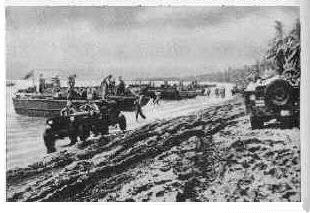 Amtracs being unloaded at the beach
Amtracs being unloaded at the beach
September 10, 1942
Quiet again so we went to river for bath. Returned to find Smith, Friedlander,
Marenchik and Crane injured by bomb. Fell 20 feet away from my shack.
*These fellows all returned to duty though.
September 11, 1942
Another alert at 1 or 2am. Expect 2,000 Japs. Another bombing but no
damage.
September 12, 1942
A quiet night but morning found us under Condition Yellow. Dodging bombs
all day. Are under some color of condition most of day.
September 13, 1942
Shelling all night from three ships. No casualties except they hit hospital.
105's and 75's fired all night and day. Three air raids. We got 52 planes.
Our planes just came in. Fired 40 rounds at beach.
*On 13 and 14 September, the Japanese attempted to support Kawaguchi's
attack on Edson's ridge with thrusts against the flanks of the Marine perimeter.
On the east, enemy troops attempting to penetrate the lines of the 3d Battalion,
1st Marines, were caught in the open on a grass plain and smothered by
artillery fire; at least 200 died. On the west, the 3d Battalion, 5th Marines,
holding ridge positions covering the coastal road, fought off a determined
attacking force that reached its front lines. This was the beginning of
the Battle for Bloody Ridge.
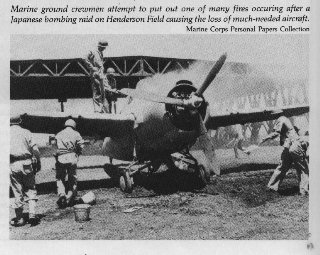
This was a busy day at Henderson Field. Planes from the
USS Wasp, which had been torpedoed by a Japanese submarine, arrived
at the base. American destroyers later sank the mortally stricken carrier
Meanwhile, the U.S. Marines held off a determined Japanese force of
two battalions which attempted to take Henderson Field. The Battle for
Bloody Ridge was underway. Col. "Red Mike" Edson and his tiny force of
300 Raiders held off the attacks from atop Grassy Knoll, a high ridge just
1,000 yards south of the airfield during night engagements over a three
day period.
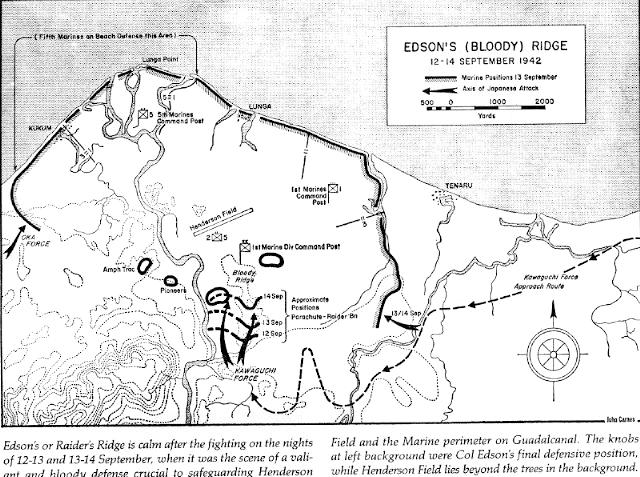
September 14, 1942
Battle started at 10 pm. Askey and I were on watch. Naval battle
for an hour. Battle of Raiders' Ridge. I Battery troops pulled out and
sent to the front as infantry to reinforce the Raiders. P-39's strafed
all morning. Casualties coming up the road by our battery. Went on patrol
but gave up as jungle too thick. Dive and high altitude bombers overhead
- no damage.
*Raider's Ridge also became known as Edson's
Ridge after Col. 'Red Mike' Edson, who was in command of the Raiders.
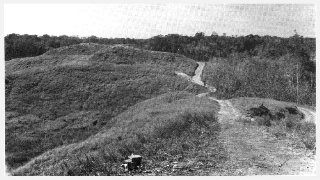 Bloody Ridge, scene of some of the fiercest fighting on Guadalcanal
Bloody Ridge, scene of some of the fiercest fighting on Guadalcanal
This was the second day in what would be the major battle for Guadalcanal.
Col. Edson's HQ was set up atop the tallest point along the ridge and the
main focus of Japanese attacks. From this spot he personally co-ordinated
defense of the embattled position. As battle fatigued Marines, wearied
from six days of raiding, patrolling and defending the ridge line began
to fall back, Col. Edson steeled his men's resolve, pointing toward the
fighting and growling, "Listen, the only thing those people have got that
you haven't is guts!" The old Marine 'Devil Dog' taunt from World War I,
"What do 'ya want to do, live forever?" was heard often. The Ridge held.
Heavy fighting left 600 Japanese dead and 143 U.S. Marine casualties.
Col. 'Red Mike' Edson
was awarded the Medal of Honor for his defense of Bloody Ridge.
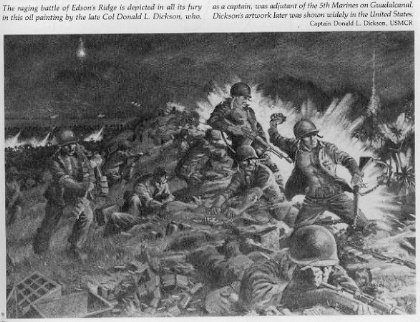 The 11th Artillery fire their Howitzers in the background as
Marines hurl grenades during the raging Battle of Bloody Ridge
The 11th Artillery fire their Howitzers in the background as
Marines hurl grenades during the raging Battle of Bloody Ridge
The 11th Marines' 105 mm. Howitzers gave good account of themselves
in the battle with the heaviest concentration of artillery fire Guadalcanal
had seen so far, dropping well placed barrages into enemy positions just
200 yards from the dug-in Marines. 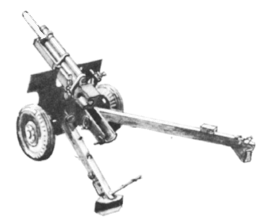
When it was over, the Marines' 105 Howitzers had fired 1,992 rounds
into the enemy's ranks - the 75's alone had unloaded more than a thousand.
The Japanese suffered 1,200 casualties.
"The way it fell it looked as if the artillery lads were trying to
burn out their barrels, so fast and furiously did the shells go over the
Raiders. Out of this barrage grew an apocryphal story: a Jap officer is
supposed to have asked later, upon his capture, to see the 'automatic artillery'
we used that night".
 - The Old Breed - The Old Breed
 105 mm Howitzer
105 mm Howitzer
|
September 15, 1942
Firing all night. Corrigan fired a couple of bursts of 50 cal.
machine gun. Don't know what he heard. Half the Japs do not have rifles.
They try to use grenades and are shot down before they can throw them.
One prisoner came out wounded. Another air raid.
*The Japanese had infiltrated the area around Henderson Field during
the Battle for Bloody Ridge.
"In our motor section - and anybody who's ever been around
an artillery motor section knows they are more or less on their own - they
lived off to one side and they were pretty careless about keeping night
guards and so on. For some reason, I remember a Japanese slipped in on
the motor section. Pfc. Tucker woke up, saw the Japanese, as I recall,
lurking around there. He had been sleeping on top of the ground - he hadn't
bothered to dig a hole - and the way I understand it, the Japanese threw
a hand grenade at him but it didn't go off. I think Tucker shot the guy
and finished him. After searching him, we found that he had taken some
coffee, some sugar and I think he had taken one of our american rifles
and some ammunition. We buried him there in the motor section the next
morning. He was probably starving...he was after anything which he could
eat. We didn't have much food laying around so he didn't find much."
|
September 16, 1942
Small arms fire at night. On watch three to six. Saw flashes from Naval
gunfire. The dope is that the General opened sealed orders. Went to the
river to bathe and watched torpedo planes take off.
*Gen. Vandegriff received orders to rotate some of his command staff
stateside. This gave him the chance to promote proven leaders and ship
out veteran commanders to train Marines back home. 11th Artillery commander
Col. Pedro del Valle could not be spared - he was the best artillery officer
Vandegriff had. General Vandegriff,
commanding the 1st Marine Division, won the Medal of Honor for his role
at Guadalcanal and later became Commandant of the Marine Corps.
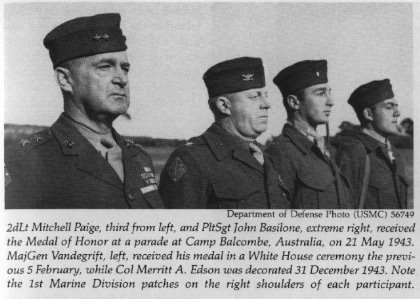
September 17, 1942
Working party at beach. 7th Marines and 1st Battalion, 11th Marines
came in. They had left Camp Lejeune in March and had been in the Fiji and
Wallace Islands.
Went aboard two ships and got chow and cigarettes. Looked for Lex MacAlilly
but was unlucky. One of our planes shot down by our own ships. The Hayes
and McCauley opened fire first. Saw gunner who was shot through
stomach. Pilot was killed. SBD. 50 cal.
*I had gone to a Hospital Ship to see an old friend.
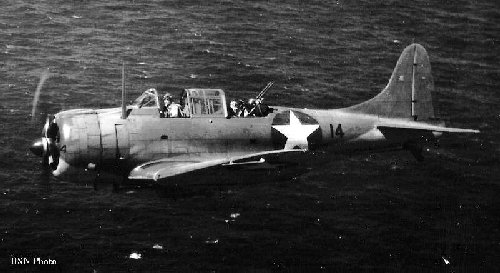
"The plane that flew in over our fleet - he'd been instructed
not to - was shot down. We could clearly see the markings of the plane from
the beach, but when somebody opened fire on it, they all opened fire. The
plane was trying to make it back to the beach but it fell in the water
about a 100 yards short."
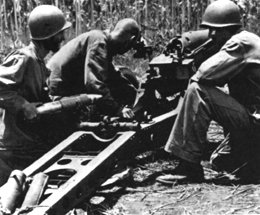
"The only incident I remember where somebody got hurt loading
a Howitzer was Lex MacAllily from Geneva, Alabama, who was loading a 75
Howitzer and got his thumb caught in the breech and cut it off. It was
hanging by a piece of skin and they took him to the hospital and sewed
it back on. He's still got the thumb but its not much good. He had enough
skin left there to save it, but I don't know how much use he gets out of
it."
September 18, 1942
Set around all morning. Shelling in the night for about 15 minutes.
Got five men. Our coast guns run them off. Saw Lex yesterday - spent the
afternoon with him.
September 19, 1942
Had bath at river. Had alarm but no planes showed up. They didn't get
here. The 105's are firing today.
September 20, 1942
No dope for this day. Must have been pretty busy or quiet - one or the
other.
September 21, 1942
The 7th Marines are pretty excited as it is their first time at front.
Few Japs around. Had work party at ammo dump in morning. Saw Lex in afternoon.
First let up in air raids - had none for a week.
September 22, 1942
All quiet except for patrol bombers taking off. Had working party at
ammo dump; was relieved - sick with dysentery. Went to see Lex.
September 23 , 1942 - Wednesday
Sgt. Askey shot the rifle out of a Jap's hands who was 20 feet off from
my hole. Working party at beach - came back by to see Lex. I had the 10
to 12 watch and reported voices to rear and at 12:30, Askey got his Jap
or shot at him. Jap patrol planes all night.
"We had heard strange voices to the rear in a language we couldn't
understand and we reported to Askey, who relieved us on the watch, that
there was "strange voices in the woods". Pretty soon after we turned in,
a Jap stood up behind us by our mud hole, which was very near. Askey saw
him in plain sight in the moonlight and he shot. He hit the rifle in the
breech. Apparently, the bullet deflected into the man's shoulder. He got
away but was killed two or three days later by Sgt. Sawicki."
September 24, 1942
All quiet but for firing to rear. Got up at 4:30 am for working party
at beach. Unloaded K-28. The 'Beetlegoose' Went to see Wilcox - at Kokum.
*The Beetlegeuse was a Marine Transport Ship.
September 25, 1942
Patrol planes and more gunfire to rear. Sgt. Sawicki went to rear about
50 yards and killed a Jap. I helped bring him out. Zig got a watch and
bayonet from him.
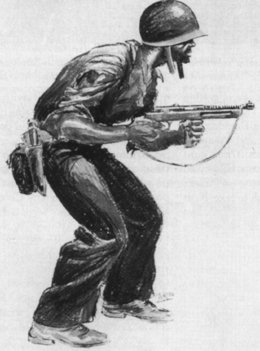
"Sgt. Sawicki had
gone to the rear of the battery where he found the Japanese Sgt. Askey
had shot two or three nights before. The man had worms in the hole in his
shoulder and he had a stick stuck in there to keep flys out of it, I guess.
Sawicki killed him with a Reising Sub-Machine Gun."
|
September 26, 1942
Working party at beach. Went aboard 'Beetlegoose' and got sandwiches.
Went swimming and went to see Wilcox again. Another air raid.
September 27, 1942
Our Aerocobras are strafing Japs on Matanikou. They say that 2,000
of them are cornered. We also had an air raid. 28 Japanese bombers.
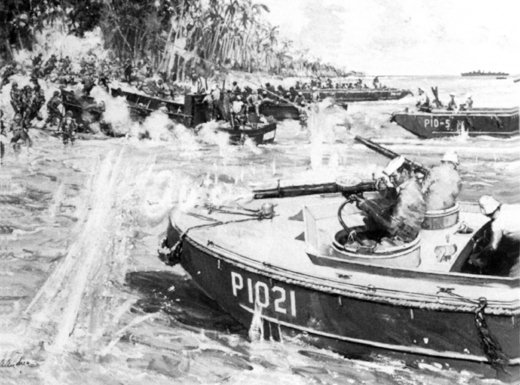 Medal of Honor winner Coast Guardsman Douglas Munro holds off
the Japs as Marines evacuate
*After some initial success, Lt. Col. "Chesty" Puller's 7th Marines had
gotten into a jam after being hurled back in four separate attempts to
secure better positions on the Matanikou River. A circling SBD saw the
word "HELP" the Marines had spelled out in the sand. The trapped battalion
was evacuated off the beaches under heavy fire.
Medal of Honor winner Coast Guardsman Douglas Munro holds off
the Japs as Marines evacuate
*After some initial success, Lt. Col. "Chesty" Puller's 7th Marines had
gotten into a jam after being hurled back in four separate attempts to
secure better positions on the Matanikou River. A circling SBD saw the
word "HELP" the Marines had spelled out in the sand. The trapped battalion
was evacuated off the beaches under heavy fire.
September 28, 1942
Had working party at beach. Went to see Wilcox and had air raid. We
got 28 bombers and eight Zeros. The pilots said the Jap planes weren't
even painted.
September 29, 1942 - Tuesday
Lots of noise to rear. Albert Schlemmer of G Co., from the 1st Regiment
- a friend from home, came by for a minute on way to beach. Two alerts
in morning but none showed up. One Zero slipped in and got one of our fighters
which was landing - slipped in behind him.
September 30, 1942
Had a peaceful night and heard the Japs are trying to evacuate their
troops who were dive bombed and strafed by SBD's. No raids but rain.
"On this day, the Japs were caught trying to evacuate their troops.
Two ships which were nearly beached were strafed and they were slaughtered.
Not many if any got away. It was said they had formed chains to hand-pass
goods or whatever to the ships and were strafed in their position; 'course
I don't imagine they stayed in that position long. I think they called
this a 'turkey shoot' or something like that."
Previous * * * Index
* * * Next
|










